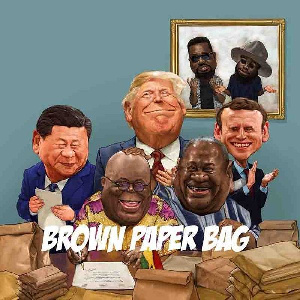Great. We can now tick off Ghanaian rap’s bucket list a song whose sole occupants are Sarkodie and M.anifest.
Days ago, in response to renewed global protests against racial inequality, stimulated this time by George Floyd’s killing in the US, the two hip-hop acts; the country’s leading punchline archers today and lyrical foes until 2018, tag-teamed for “Brown Paper Bag.”
Mainly due to the profile of its authors, and partly owing to the topical nature of the themes the song and its chilling accompanying video address, the Nova-produced joint is currently the most popular musical release in Nana Akufo-Addo’s Accra.
Normally, a collaboration between heavyweights – between this particular pair of heavy hitters – must result in the unprecedented. And heading into the recording booth, one reckons that the men were well aware of this fact. True, there’s nothing new under the sun, and no one must dictate for an artist, but historically, when musicians in the weight class of Sarkodie and M.anifest have come together, it has supplied the historic. Anthems.
That is the standard. Both men can say this about their collaborations with Obrafour, whom they both name as cultural godfather. Sarkodie has achieved this twice with Shatta Wale; on “Dancehall Commando,” and “Megye Wo Girl.” M.anifest got Grammy notice for his efforts on Burna Boy’s “Another Story.”
And so, “Brown Paper Bag” delivers the historic for sure, again, due to the clout of both acts. That they have managed to cultivate staunch fan bases means that whatever work they issue is considered the Holy Grail by their respective disciples who, baptised in ardour for their idols, are heavily dedicated to defending and justifying their every last bar, making a poetic feast of their every punchline, and treating even fair reproach with scorn with which zealots attend blasphemy.
An anthem, however? Not so much. That is where the men fail us.
Throughout recorded history, anthems have driven activism. Hence, whereas it may have been a deliberate decision to unload over instrumentation that waves goodbye to the anthemic (as alluded to by Sarkodie in an IG Live chat with M.anifest following the song’s release), it also strikes many Ghanaian ears as a tad problematic. The issue is not that the men chose to take on, with such solar panache not unlike we have seen from them at their creative best, a pack of sensitive topics. They excoriate corrupt African leaders, reecho the effects of slavery, racism, imperialism, and religious brainwashing, and even reexamine our notions of freedom and sense of self. Frankly, we would have been scandalised if they rapped about anything lighter. Example? Turn on your radio set.
But this is Afrobeats terrain: rhythm accompanies our thought process. It has for centuries. If the song arrives stripped of dance tempo, it has failed. True, it’s a poor way of assessing music. Do our elders not have a saying about drinking and reasoning together simultaneously? Therefore, rhythm as litmus test holds some merit.
Sadly, no matter how pertinent “Brown Paper Bag’s” subject matter is, there’s the tendency that it will be forgotten in a few months. Why? It arrives in the sort of hip-hop that even hip-hop heads may deem dutiful, hence its reach is instantly restricted. Bereft of hooks, the instrumentation of the song is crafted with chords that fend off dance; instead inducing a frightful, contemplative atmosphere complete with doomy humming and the blast of gunshots. Insofar as this facilitates the discussion it hosts, it is fit for purpose. After all, this is not a forum for the fainthearted.
But consider this: Were “Brown Paper Bag” ensconced in more galvanising rhythm, would it not a more effective rallying point; its impact not be more emphatic in the way that transcends just the hardcore hip-hop demography? See “We Shall Overcome” which American slaves fell on in the late 18th century, Obrafour’s “Nya Ntetee Pa” and, again, Burna Boy’s “Another Story.”
Sarkodie himself has at least two previous releases he could have drawn from. Here, I refer to “The Masses,” and the danceable, hence slightly more successful “Dumsor.” Of the Sarkodie songs I’ve cited, the former came devoid of a hook, the latter wasn’t. A difference is palpable. “Rich Nigger Sh*t,” “Hand to Mouth,” and “Gboza,” also examples of Sarkodie unpacking social issues have lasted significantly because they arrived in dance rhythm. 2008’s “Gentleman,” 2010’s “Coming to America,” 2011’s “Suffer” and 2014’s “Someway Bi,” all by M.anifest corroborate my argument further.
In these parts, tempo matters–even when the music caters to political activism.
Because they have yet to join protesters on the streets, only lecturing from the province of privilege, “Brown Paper Bag” may also elicit blowback. When a musician wants to assert themself as one deserving higher attention or respect, they turn to political songs. But Fela, the father of fury, showed throughout his musical career, that a song is merely the starting point of activism. Both Sarkodie and M.anifest have taken inspiration from the venerated Nigerian in the past; Sarkodie on “Dumsor,” and M.anifest on “Gentleman.” Neither has, however, put their lives on the line on the scale that Fela did.
Maybe that is not needed in the age of the internet (hashtags have proven to be a valuable political tool in recent years). Again, Nobody is asking Sarkodie or M.anifest to literally die for their country. Still, because it is the Fela method with which we receive all activism that takes the form of music, have M.anifest and Sarkodie, here too, not sinned and fallen short of the glory of the gods of activism?
Here’s a final takeaway from “Brown Paper Bag”–one that positively colours image of its creators: With their song, M.anifest and Sarkodie have demonstrated that they recognise the influence they share and are not scared to add their voice to urgent matters of socio-political importance. That is a remarkable thing to say about today’s musician who, it seems, is often solely inspired to write vain songs.
And in the end, is it not a primary prerogative of the prudent artist to–as Nina Simone put it–to “reflect the times”?
 Home Of Ghana News Ghana News, Entertainment And More
Home Of Ghana News Ghana News, Entertainment And More






